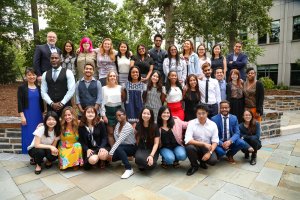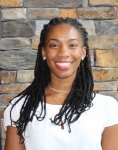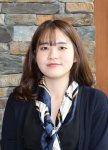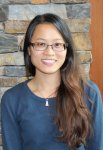The Duke University School of Nursing (DUSON) offers a wide range of global immersion courses to better prepare students to be aware of health disparities around the world. DUSON’s global immersion courses seek to bring to life DUSON’s commitment to “take DUSON to the world and bring the world to DUSON.” In addition to the overseas courses, the School is making global learning opportunities available right here at home for students and visiting international scholars.
 The DUSON Office of Global and Community Health Initiatives recently hosted its second cohort of participants for the two-week course entitled “Exploring Patterns of Global Health and Illness.” DUSON welcomed 25 students and international faculty representing Barbados, Japan, Korea, Netherlands, Oman, Philippines, and the United Kingdom. In addition, four DUSON Accelerated Bachelor of Science in Nursing (ABSN) students participated in the course.
The DUSON Office of Global and Community Health Initiatives recently hosted its second cohort of participants for the two-week course entitled “Exploring Patterns of Global Health and Illness.” DUSON welcomed 25 students and international faculty representing Barbados, Japan, Korea, Netherlands, Oman, Philippines, and the United Kingdom. In addition, four DUSON Accelerated Bachelor of Science in Nursing (ABSN) students participated in the course.
The participants interacted with diverse populations in Durham County, including those living in poverty, homeless persons, substance abusers and the elderly. International members of the cohort gained valuable experience seeing first hand and working with diverse health care systems, community-based initiatives and treatment protocols in different cultural settings.
 Allison Daniel, a student at Barbados Community College, came to Duke at the recommendation of a faculty member. “I was glad that my faculty advised me to come,” she said. “It gave me an opportunity to experience different cultures as well as what other countries deal with in regards to health care. Barbados is a tourist attraction so if someone from another country becomes sick, it allows me to understand how to treat them based on their culture.”
Allison Daniel, a student at Barbados Community College, came to Duke at the recommendation of a faculty member. “I was glad that my faculty advised me to come,” she said. “It gave me an opportunity to experience different cultures as well as what other countries deal with in regards to health care. Barbados is a tourist attraction so if someone from another country becomes sick, it allows me to understand how to treat them based on their culture.”
 Hussain Al Bulushi is a nursing student from the Oman Nursing Institute. Participating in the Duke experience allowed him to meet different people from around the globe. “I was interested in participating in the global health course to have an opportunity to learn new concepts I nursing,” he said “I wanted to learn concepts outside of the clinical process. Having this Duke experience allowed me to learn about the various aspects of nursing, including research.”
Hussain Al Bulushi is a nursing student from the Oman Nursing Institute. Participating in the Duke experience allowed him to meet different people from around the globe. “I was interested in participating in the global health course to have an opportunity to learn new concepts I nursing,” he said “I wanted to learn concepts outside of the clinical process. Having this Duke experience allowed me to learn about the various aspects of nursing, including research.”
The course included a clinical observation at the Triangle Residential Options for Substance Abusers (TROSA) program. TROSA is an innovative, multi-year voluntary residential program that enables substance abusers to be productive, recovering individuals by providing comprehensive treatment, work-based vocational training, education and continuing care. The students in this year’s course worked at TROSA to gain substance abuse clinic experience. Students witnessed rehabilitation techniques and learned how to better understand substance abuse as a disease in hopes of being better equipped to treat it.
Daniel said she was impressed by the thoroughness of the TROSA program. “TROSA is different from how (substance abuse) clinics are run in my country,” she said. “TROSA is voluntary and free. The community is very supportive and I was impressed by the mindset people had.”
 Ewna Womans University student Joan Kim said TROSA helped her see that substance abuse is a disease, and that diseases can be cured. “TROSA showed me that substance abusers can still live on their own, and TROSA gives individuals hope that they can be a better person.”
Ewna Womans University student Joan Kim said TROSA helped her see that substance abuse is a disease, and that diseases can be cured. “TROSA showed me that substance abusers can still live on their own, and TROSA gives individuals hope that they can be a better person.”
Daniel said the course opened her eyes to the fact that health issues aren’t localized. “Before this course, I had no knowledge about Oman or Korea and the health concerns these countries face,” she said. “This course allowed me to realize that health issues aren’t localized as well as what is working versus not working in other countries.”
 Trinh Tran, a DUSON ABSN student, was surprised by the differing levels of education in each country. “Some countries focus more on the theory based clinical practice whereas other countries look at the holistic picture” she said. “America tends to look at the holistic picture.”
Trinh Tran, a DUSON ABSN student, was surprised by the differing levels of education in each country. “Some countries focus more on the theory based clinical practice whereas other countries look at the holistic picture” she said. “America tends to look at the holistic picture.”
Through this program, Tran says she learned how to be a leader. “As nurses, we have the responsibility to advocate for our patients, and we know our patients the best” she said. “We’re not just nurses, we spend hours and hours at the bedside with the patient so we have the responsibility to advocate for them.”